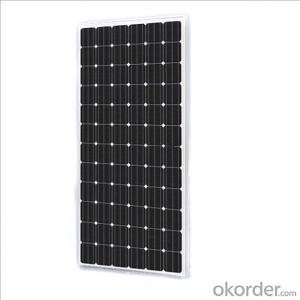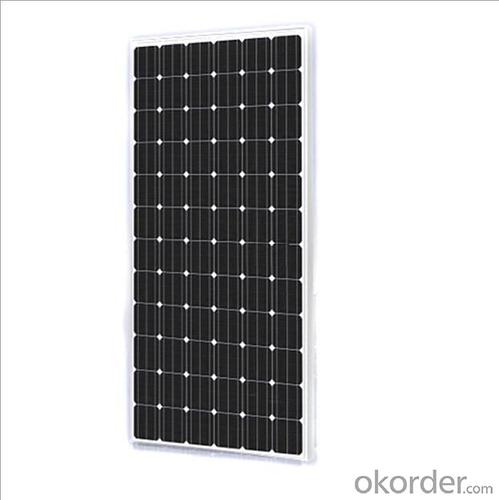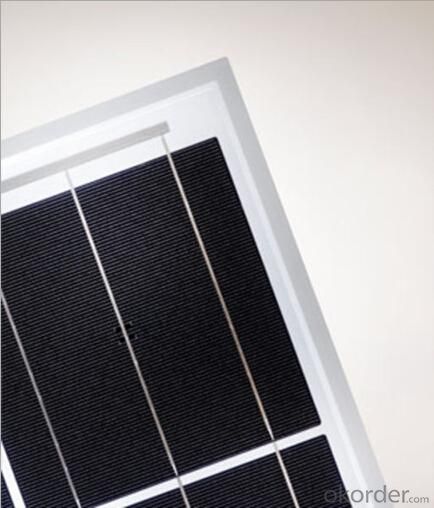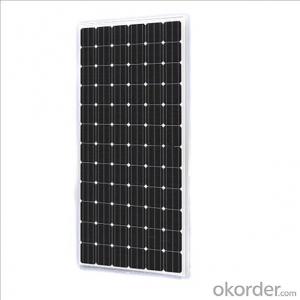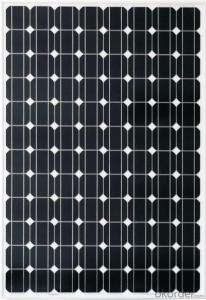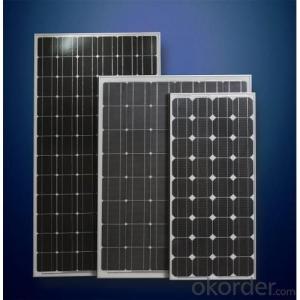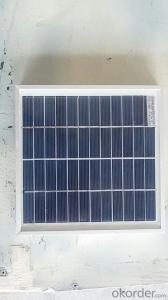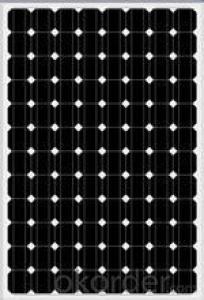Solar Panels for Car Camping - Monocrystalline Solar Module 270W-300W
- Loading Port:
- China Main Port
- Payment Terms:
- TT or LC
- Min Order Qty:
- -
- Supply Capability:
- -
OKorder Service Pledge
OKorder Financial Service
You Might Also Like
1.Structure of Solar Module Description
CNBM Solar's photovoltaic module is designed for designed for large electrical power requirement. It is the optimal choice for both on-grid and off-grid power systems. CNBM Solar offers high performance of power per square foot of solar array.
2.Main Features of the Solar Module
Solar Cell: High efficency crystalline solar cell. Even if under the weak light, the solar module can produce maximum power output.
Tempered glass: Anti-reflecting coating and high transmission rate glass increase the power output and mechanical strength of solar module.
EVA and TPT: Using high quality EVA and TPT to prevent destroying and water.
Strong aluminum frames to strengthen the load hold and to stand against high wind.
Junction box: Multi function junction box with water proof.
Long lifetime: ≥25 years; Less power decrease.
Good performance of preventing from atrocious weather such as wind and hails.
Resisting moisture and etching effectively, not effected by geology.
The certificate issued by international authority: UL, TUV, IEC, VDE, CE.
3.Solar Module Images
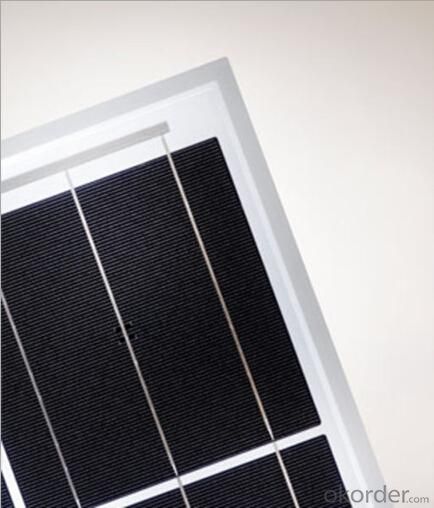
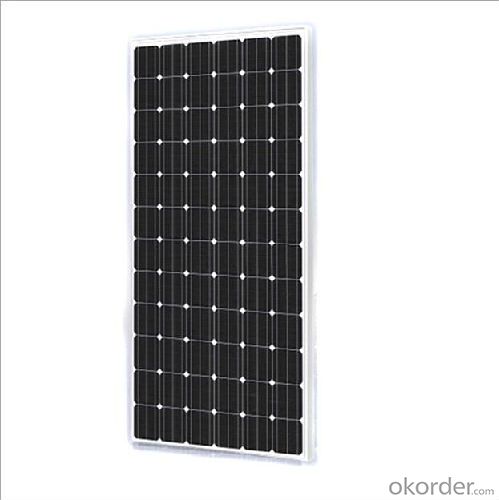
4.Solar Module Specification
Solar panel pv module manufacturer
High efficiency: mono panel 18% poly panel 17%
30W-300W mono solar panel poly solar module
Mono-crystalline Solar Panel / Poly-crystalline Solar Panel
We Are Manufacturer
We manufacture mono solar panel and poly solar panel from 30W-300W
We produce Solar PV module from solar cell to solar module
We are capable to produce 2MW solar panels per month
Warranty
5 years material and workmanship warranty
10 years at 90% of the minimal rated power output
25 years at 80% of the minimal rated power output
Specifications
Electrical Spec. | Pmax | 240W |
Vmp | 35V | |
Imp | 6.86A | |
Voc | 43V | |
Isc | 7.77A | |
Physical Spec. | Cell Material | Poly |
Wind Resistance | 60m/s | |
Surf. Load-bearing | 200kg/m2 | |
Hail Load-capacity | 25mm, 80km/h | |
Packaging Data | Dimensions (mm) | 990*1600*35 |
Weight | 25kg | |
20’ Container | 224pcs | |
40’ Container | 448pcs | |
Temp. Coefficients (TC) | NOCT | 45°C±2°C |
Current TC | 0.06±0.01%/K | |
Voltage TC | -(155±10)mV/K | |
Power TC | -(0.5±0.05)%/K |
Product Details
Advanced EVA encapsulation system with triple-layer back sheet meets the most stringent safety requirements for high-voltage operation
Anodized aluminum frame: The sturdy, anodized aluminum frame allows the modules to be mounted on a variety of standard racking systems and to withstand harshest conditions
Ultra reliable bypass diodes prevent damage through overheating due to shaded or defective cells
Packing method: Innovative, environmentally friendly packing method using pile-edges insures modules arrive in perfect condition
New frame design incorporating hexagonal shaped Drainage holes, with more grounding holes, provide flexible installation and using
Waterproof Battery Box
Waterproof battery box, ideal for high humidity area
Air-bleed vent design, specially for gel and lead acid battery
High strength: PVC plastic box and wire reinforced PVC conduit
5.FAQ of Solar Module
1. Q: Do you have your own factory?
A: Yes, we have. Our factory located in Jiangyin city, jiangsu province.
2. Q: How can I visit your factory?
A: Before you take off from your country, please let us know. We will show you the way,or arrange time to pick you up if possible.
3. Q: Do you provide free sample?
A: Usually we do not offer free sample
4. Q: Could you print our company LOGO on the nameplate and package?
A: Yes, we can do that.
- Q: Can solar panels be installed on a retirement home or assisted living facility?
- Yes, solar panels can be installed on a retirement home or assisted living facility. In fact, many retirement homes and assisted living facilities are recognizing the benefits of solar energy, such as reduced energy costs and environmental sustainability, and are choosing to install solar panels on their buildings.
- Q: Can solar panels be used in areas with frequent thunderstorms?
- Yes, solar panels can be used in areas with frequent thunderstorms. While thunderstorms may temporarily reduce solar panel efficiency, modern solar panels are designed to withstand harsh weather conditions, including lightning strikes. Additionally, thunderstorms also bring heavy rainfall, which can help clean the solar panels and improve their performance.
- Q: Solar panel packages have different levels of power. For instance you can get a kw system but is this kw per hour or day. How does this work?
- A kW is an on the spot degree of means. A kWh is a level of means produced via the years. A KW array produces an on the spot means of 000 watts. whether that could be a 2V panel which skill it produces eighty 3 amps of modern-day. In 3 hours it produces 3kWh (kilowatt hours) of electrical energy, no longer 3kW. A 3kW 2V array might produce a similar quantity of electrical energy in one hour at 079 amps.
- Q: How do solar panels impact the electrical grid?
- Solar panels can have a positive impact on the electrical grid by generating clean and renewable energy. When connected to the grid, they can contribute to reducing the overall demand for electricity, especially during peak times. However, their intermittent nature and fluctuating output require grid operators to carefully manage the variability to ensure grid stability. Additionally, solar panels can decentralize power generation, leading to a more resilient grid and potentially reducing transmission losses.
- Q: We are thinking about useing solar panels for our house.Does anyone know about solar panels? If so could you please tell me some information on them,and the cost for a home,to install them.
- It depends on what you want to do with the solar panels, Heat your water , heat a pool or spa, or to make electricity to use instead of that supplied by the power company. The first three are fairly easy and straight forward. Depending on the amount of water that needs to be heated, the location you live at in relation to the equator and the location of the solar panels and piping . The panels for this applicatin are 00s of feet of piping that absorbs heat from the sun and circlate it. The panels them selves are sort of inert and can be very heavy when filled with water.. Makeing usable power to replace the power company is a real problem because among other things solar cells create DC voltage. A house runs on AC voltage. So all of the items to heat water still apply, location, placement, etc. But now we have to figure hrs of sunlight the output of the cells running the power to a transformer to transform the voltage from 2 volts DC to 20 volts DC and then running the power thru a converter to change it from DC to AC at each point ( transformer converter ) there is a loss of power do to a change in current. After all of the above if a cloud comes by your power will stop, and at night you will have no power. The fix for that is storage cells AKA batteries which store the power until you need it, like night time. The glamor of a all solar powered home is great,, but it isn't practical. So What to do, You eliminate the battery storage, and also hooking up the power to your home. You feed it right into the power companys wiring and guess what? The electric meter on you house runs back wards your send more power to them during off peak times that your using. For every dollar the meter runs backward you get a free dollars worth when you need it. This is a way of storing the power as credit with the power company instead of batteries Its a lot to understand and I hope I helped
- Q: Can solar panels be used in cloudy regions?
- Yes, solar panels can still be used in cloudy regions. While solar panels are more efficient in direct sunlight, they can still generate electricity in cloudy conditions. Clouds diffuse sunlight, but some sunlight still reaches the solar panels, allowing them to produce power. However, the energy output may be lower compared to sunny regions.
- Q: I'm making a model of a solar photovoltaic tower for a school project. I need a way to store energy, and we thought about using capacitors (mainly because of our somewhat limited funding). The tower will have a small photovoltaic panel (around the size of a laptop keyboard with number pad) and some (around 50) quot;heliostats(just the mirrors, no moving parts). What kind of capacitors should i use? and would a capacitor bank be better? i am getting confused with all those uF, pF and can't see the difference.Thanx in advance
- There okorder /
- Q: My Grandfather just purchased a cheap solar panel kit for his ranch that could not muster enough power to run his mini fridge.He has two 6 volt batteries running positive to negative and would like to add more batteries. Probably 2volt. How would he go about hooking up the other batteries and what kind of wire or coil should he use.Also, I saw on youtube a guy recommending a lead-acid battery from walmart for under $20. I was just going to go to ecology and just pick up some used batteries but I may be wrong.Any help for a first timer might help me and my gramps out will be appreciated.Thank you
- If interested in much more info about solar panels then I would suggest reading these articles renewableenergyarticles.blogspot....
- Q: I am intrested in buying solar panels to save a buck and even maek some money off of it but I was wondering what kind? How Much? How Many? Are they easy to install? Whats the best brand? I want alot of information on this if anyone can give me some help on it in a user friendly way it would be appreciated!
- If okorder and search for solar panels, they list companies that sell solar panels and you can compare prices there.
- Q: i also need to know how does a solar panel work
- When sun light reaches solar panels, it releases electrrons to make an electric current. They are made od silicon or germanium which has this property. Photons in the sun light when hit on semiconductor like silicon, releases electrons o make the current flow.
Send your message to us
Solar Panels for Car Camping - Monocrystalline Solar Module 270W-300W
- Loading Port:
- China Main Port
- Payment Terms:
- TT or LC
- Min Order Qty:
- -
- Supply Capability:
- -
OKorder Service Pledge
OKorder Financial Service
Similar products
Hot products
Hot Searches
Related keywords
